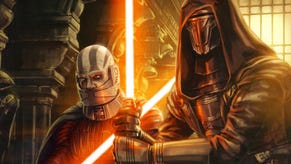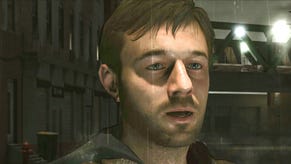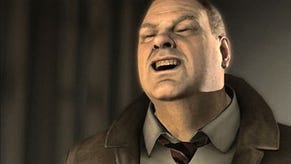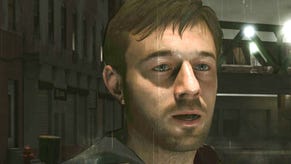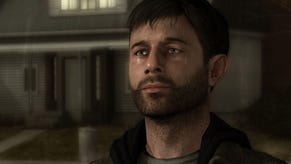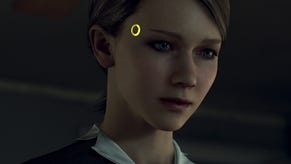Heavy Rain
Life on Mars.
"We don't make Dragon's Lair! This is not Dragon's Lair - do you think I'm crazy? I'm not stupid. Do you think I develop on PlayStation 3 to do Dragon's Lair again? It would be absurd. Of course it's not." David Cage is basically hopping up and down in the middle of a hotel room in Germany. "When there is an action sequence, yes we integrate this quick-time event sequence. We've done it really in a new way, we really started from a blank page again to try to take the best out of this type of interface and find the thrill and excitement and make you feel at the heart of the action."
There's no word of a lie there. Describing Heavy Rain as a bundle of quick-time events simply isn't accurate. Although, doing so has led to some excellent sarcasm, my favourite being smartgun's comment on the Mad Jack video: "I like the bit where you have to press Triangle. I love pressing Triangle."
But while you may be tugging odd triggers and choosing between context-sensitive button prompts, rather than twirling analogue sticks to move and see and punching people with the X button, you're in full control almost all of the time. The QTE jab must be particularly frustrating for Cage, too, because Heavy Rain's interface is unusual, but it's slick, and actually far more versatile than the majority of other action-adventure games to which people refuse to compare it.
It not only gives you direct control over a vast number of items in the environment, but combines that with numerous options to express yourself, and in scenarios other games would choke on. During quieter scenes, exploring the sets Quantic Dream has built to tell its story is almost distracting. Ooh, I can open the microwave. Ooh, I can turn on the washing machine. Ooh, I can juggle the fruit. The fine detail is amazing.
Up to now presentations of Heavy Rain have focused on tension and action. The original teaser scene involved breaking into a house and then escaping again when its murderous owner returned unexpectedly. FBI profiler Norman Jayden's investigation at a wrecking yard ended in a brutal fight over and around a crusher and a JCB. Madison Paige's attempt to outwit a club owner at E3 was tense and uncomfortable (and pretty distasteful to some). Today's scene certainly is quieter: it's Ethan Mars, a single dad, looking after his son for the evening.
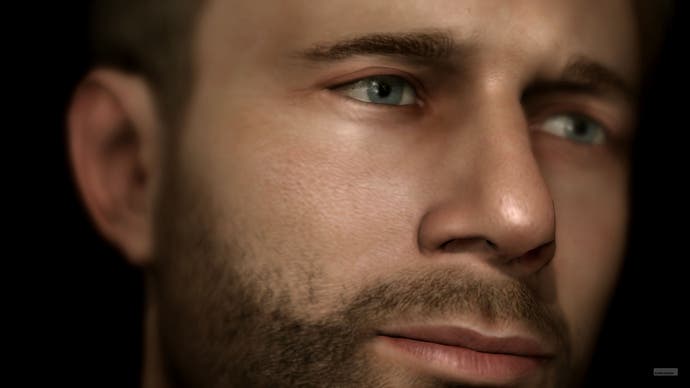
Heavy Rain has four playable characters (the one I've not mentioned so far, Scott Shelby, is a private detective) and each has a particular interest in the Origami Killer, whose victims are discovered dead, four days after their abduction, having been recently drowned in rainwater. At the stage we're seeing Ethan Mars today, his involvement isn't completely set: it won't be until his son, Shaun, is kidnapped, and he realises he only has four days to do something about it.
That's why there's no essential gravity or urgency to the scene, but also why, for Cage, it's so essential: in order to empathise with Ethan's plight later on, we first need to get to know him, and understand his relationship with his son. By wandering around his bleak, depressing little terraced house (it reminds me of the place my dad bought when my parents split up), and speaking to Shaun, we get to see that in action.
It's also, in a game where many events will be determined by your actions, full of minor decisions. On the blackboard in the kitchen there's a schedule for the evening - give Shaun a snack, get him to do his homework, make him dinner, let him watch TV, put him to bed. You can choose to do your best for him - gently put your foot down about getting the homework out of the way, for instance, and check it for him afterwards - or not bother. If you switch off the TV and refuse to let him watch cartoons, he goes to his room and screams at you when you confront him.
It's easy to find out about Ethan and Shaun's past, as the game weaves it into a number of scenarios - Ethan blames himself for the death of Shaun's brother, who ran in front of a car after getting lost on a shopping trip - but the more you explore the house the deeper the revelations go. In Ethan's office there's an architect's drawing coated in dust - a reminder of happier days in the family home and his old job. If you switch on the small TV here Ethan watches a home movie of his sons playing in the garden, and breaks down crying.


